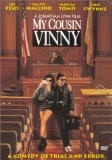It’s been too long since I’ve had a post in this admittedly infrequent series. So as kind of transition from the legal oddities that have been appearing each Friday, I thought it appropriate to talk about one of my favorite movies about lawyers — My Cousin Vinny.
 Now My Cousin Vinny may not wow a lot of people. While Marisa Tomeia won the Oscar for Best Supporting Actress in the film and it gets an 86 percent rating at Rotten Tomatoes, it receives only a 75 percent rating from “top critics.” But when it comes to lawyers, the film is a hit. In fact, it finished third on the ABA Journal‘s 2008 list of the 25 Greatest Legal Movies.
Now My Cousin Vinny may not wow a lot of people. While Marisa Tomeia won the Oscar for Best Supporting Actress in the film and it gets an 86 percent rating at Rotten Tomatoes, it receives only a 75 percent rating from “top critics.” But when it comes to lawyers, the film is a hit. In fact, it finished third on the ABA Journal‘s 2008 list of the 25 Greatest Legal Movies.
Distilled to its essence, two college students are charged with murdering a clerk at a “Sac-O-Suds” convenience store in rural Alabama. Thinking the police are talking to them about shoplifting a can of tuna, they inadvertently confess. Bill (Ralph Macchio of Karate Kid fame) has a cousin, Vincent “Vinny” Gambini, who graduated from the Brooklyn Academy of Law, a correspondence school, six years earlier. Thing is, Vinny, played by Joe Pesci in inimitable Pesci style, just passed the New York bar six weeks ago after six tries. Still, he travels to Alabama with his girlfriend, Mona Lisa Vito (Tomei), to represent them. Their personalities and dress not only make them stand out, it puts Vinny at odds with the trial judge, the last role played by Fred Gwynne, best known as TV’s Herman Munster.
Why is the film such as hit with lawyers? Because the comedic farce lets Vinny do and say things any lawyer who’s been in the courtroom would love — or has wanted — to do or say. Hs response to the prosecution’s opening statement? “Everything that guy just said is bullshit. Thank you.” Clearly, the most concise and brilliant opening statement in legal history. Or there’s the following colloquy, the last line of which is sotto voce:
Judge: I don’t like your attitude.
Vinny: So what else is new?
Judge: I’m holding you in contempt of court.
Vinny [to Bill]: Now there’s a fucking surprise.
Vinny struggles throughout with procedure and finding attire that matches his style and the judge’s rules. The trial itself is a wonderful farce and Vinny’s cross-examination of the prosecution witnesses is excellent, including destroying one witness’ testimony by referring to “magic grits.” Yet there’s plenty of other humor outside the courtroom, much of which stems from Vinny’s Brooklyn tough guy tone.
For example, when he first meets Bill’s friend, Stan, in their prison cell, there is a deftly scripted misunderstanding about prison rape. Scenes with Vinny and J.T., a local yokel who loses $200 to Lisa in a game of pool, are classic. In their first encounter, a “negotiation” ensues when J.T. tells Vinny he will only get the money “over my dead body.” “You like to renegotiate as you go along, don’t you?, ” Vinny says. “Well here’s my counter-offer: do I have to kill you? What if I were just to kick the ever lovin’ shit out of you?”
Whether inside the courtroom or out, Vinny’s and Lisa’s take on the law and life give My Cousin Vinny a unique style and flavor. And perhaps because of how it satirizes the trial process, it is one of the few films I can watch over and over and laugh out loud each time.
Vinny (to J.T.): Okay, let’s see if we agree on the terms. The choice now is: I get my ass kicked, or, option B: I kick your ass, and collect the $200. I’m goin’ with option B, kicking your ass and collectin’ two-hundred dollars.








I never realized this movie was such a hit with lawyers, though I guess it makes sense. The only thing I remember from it is where Vinny has Mona on the stand and is questioning her about the car.